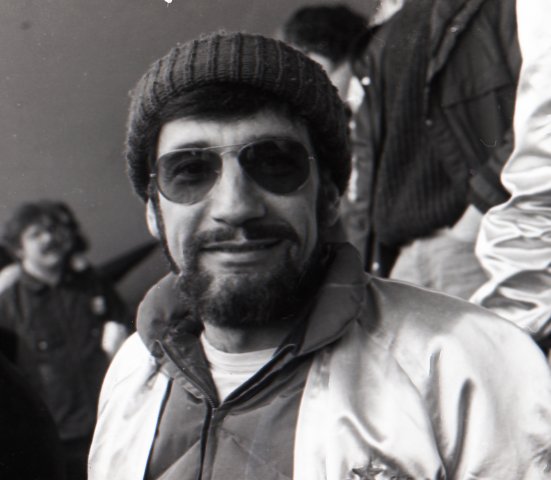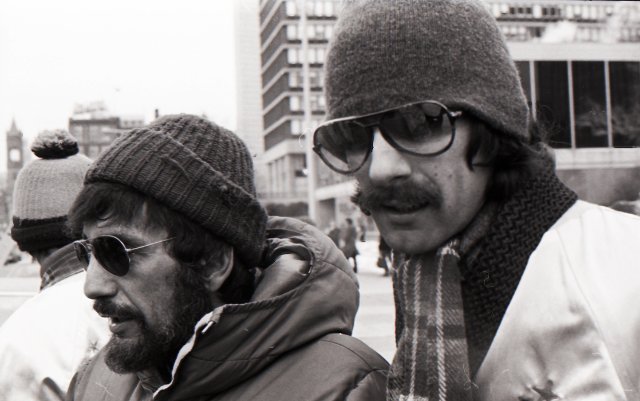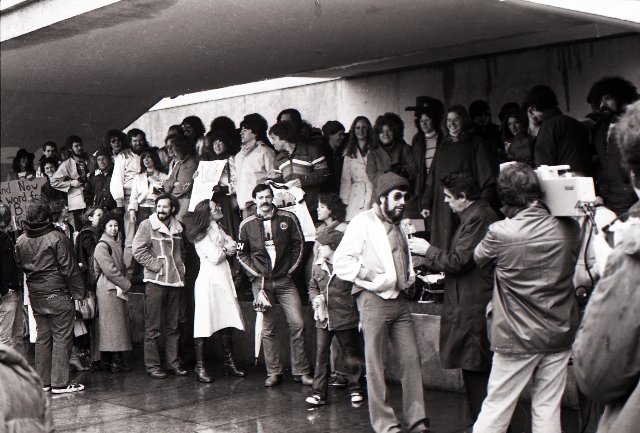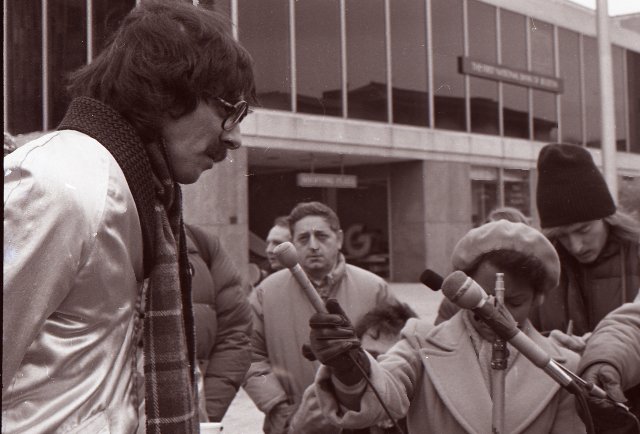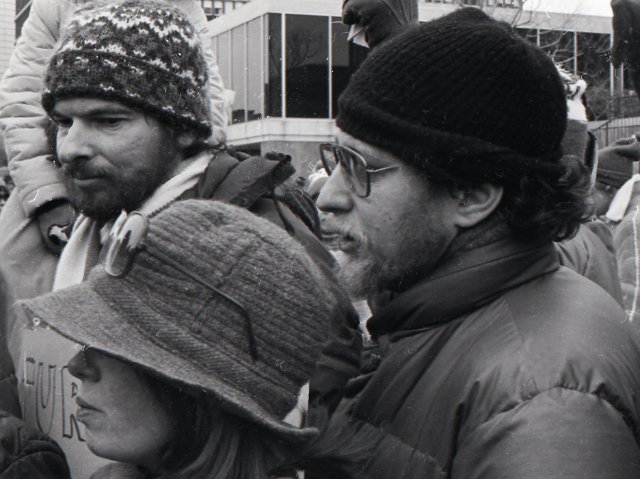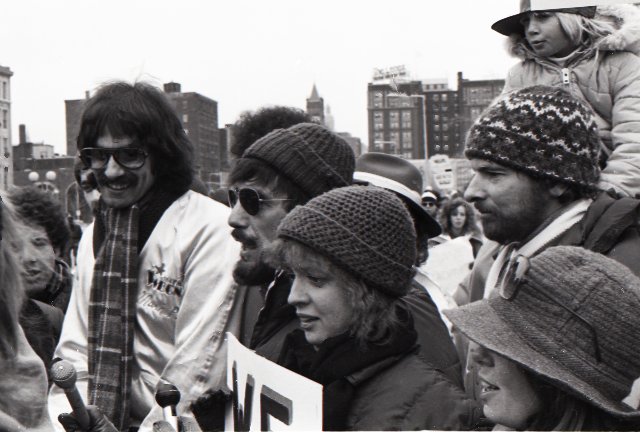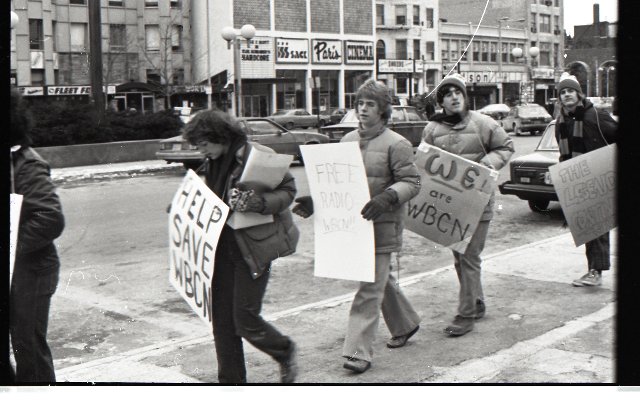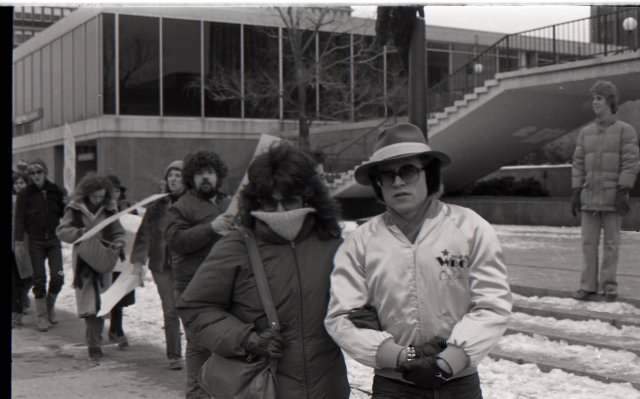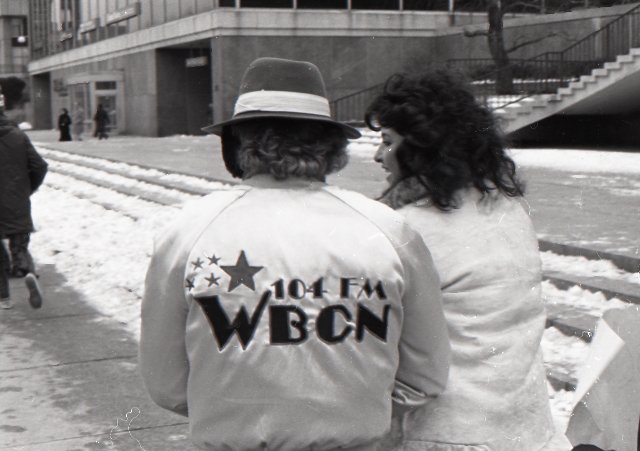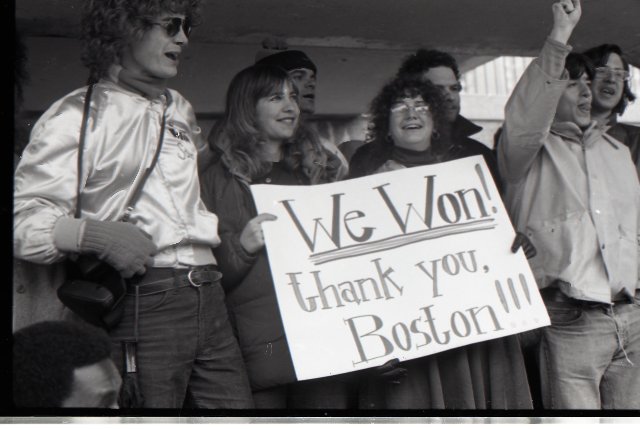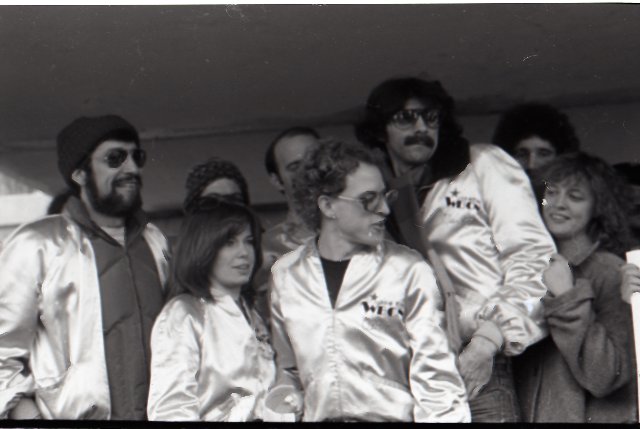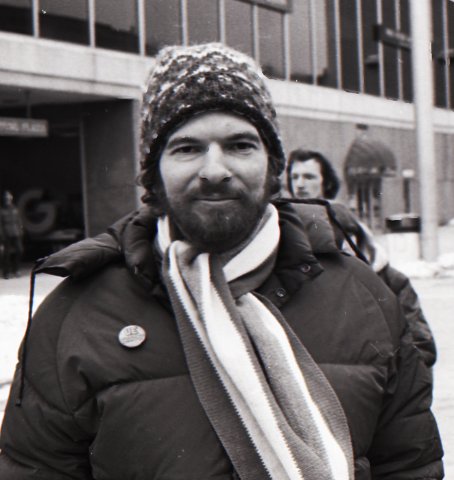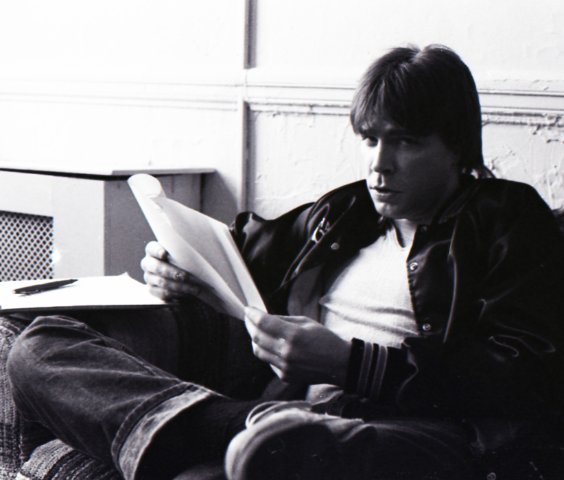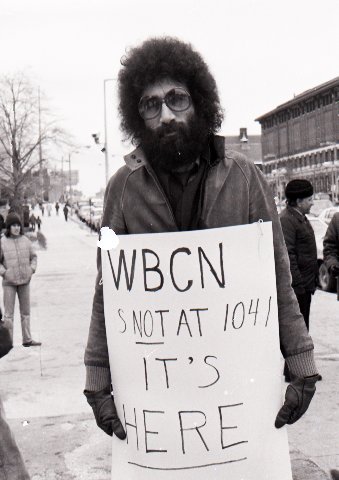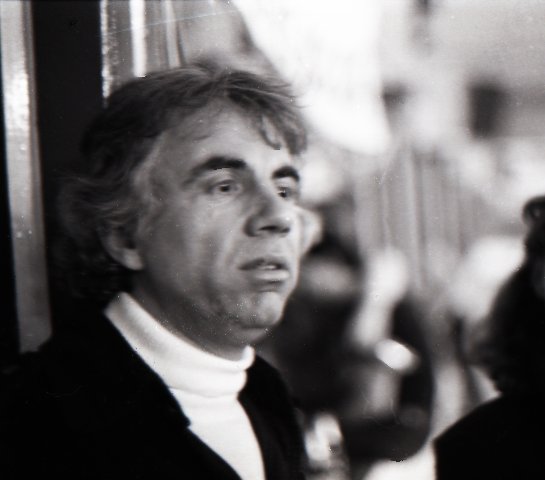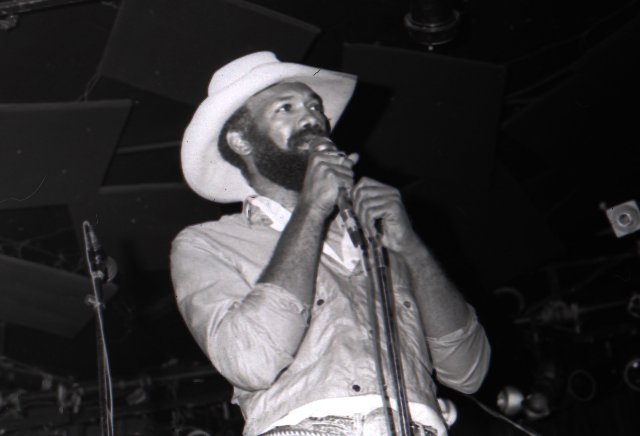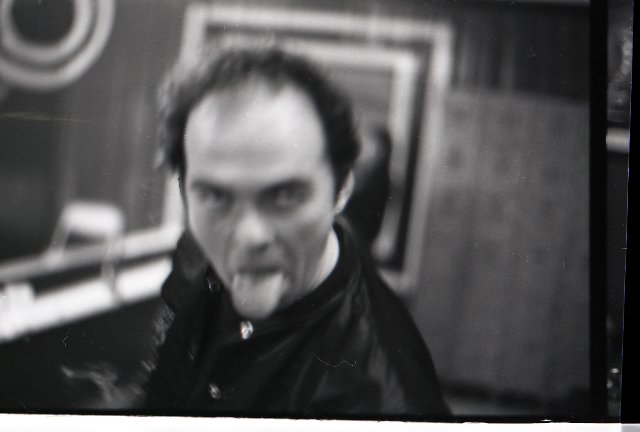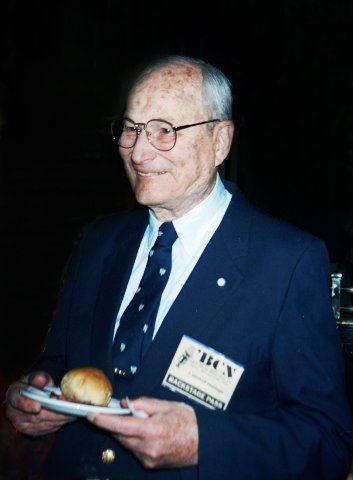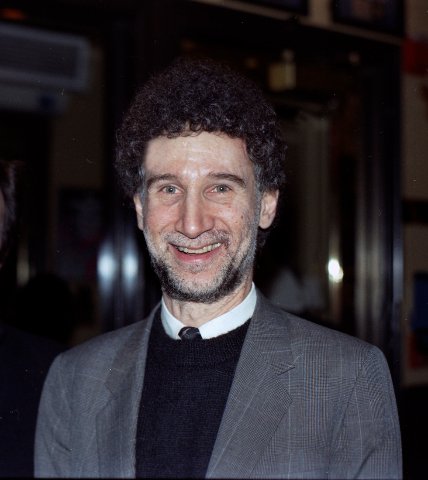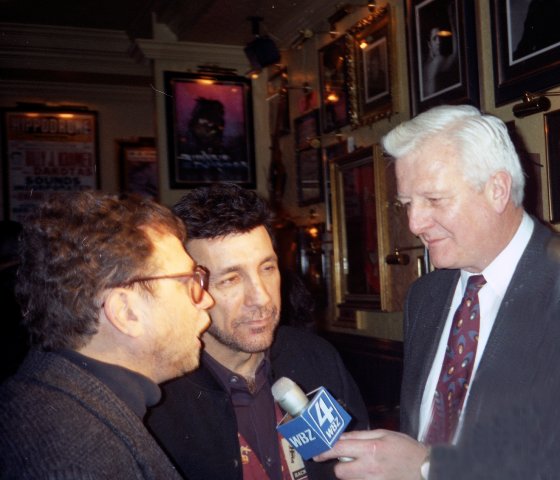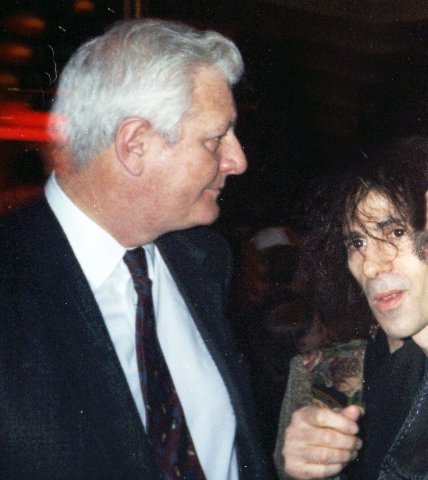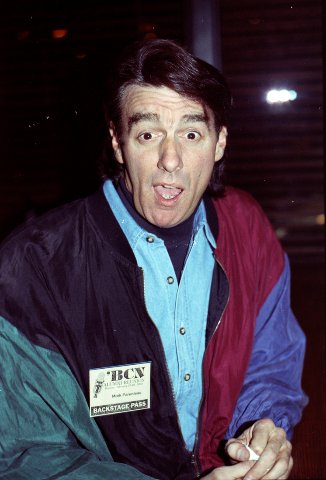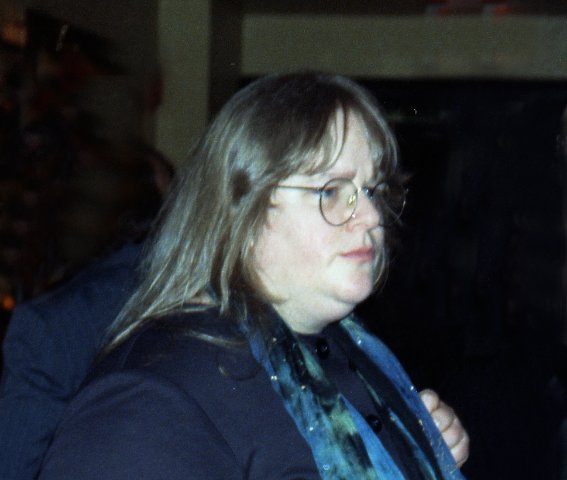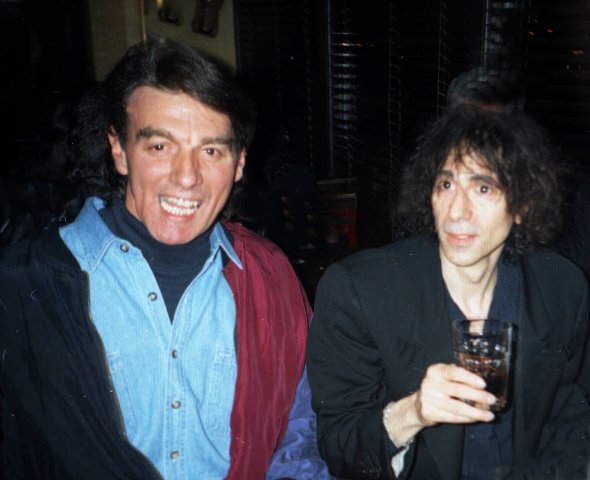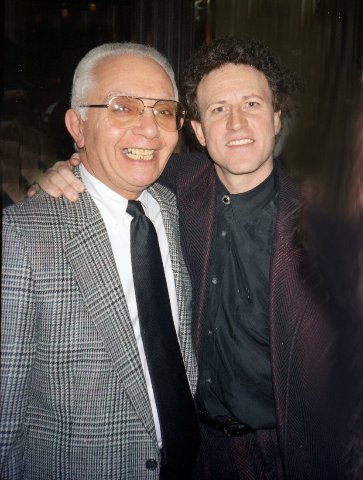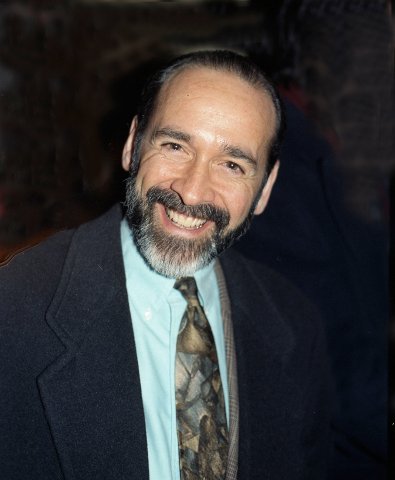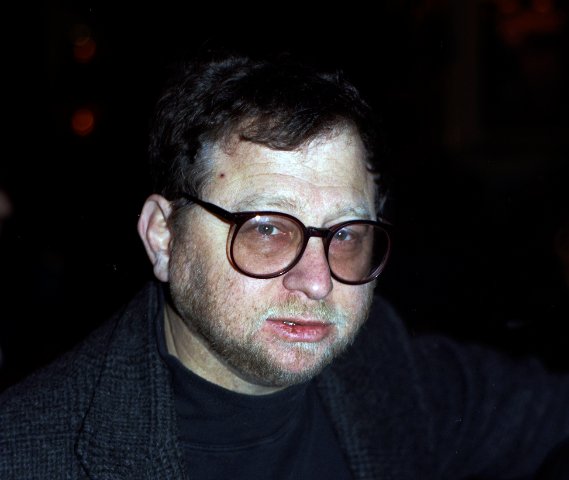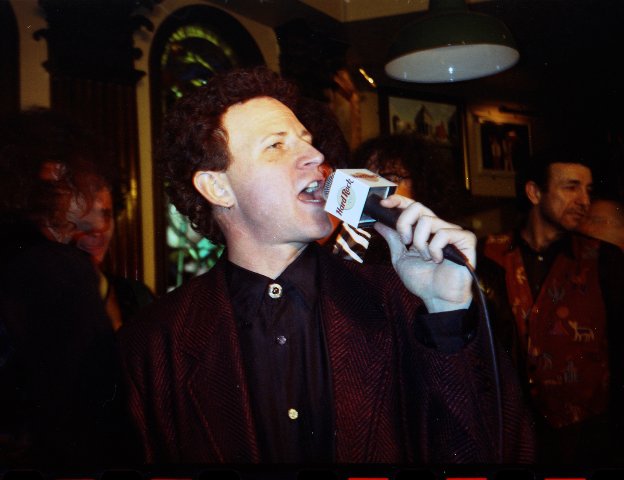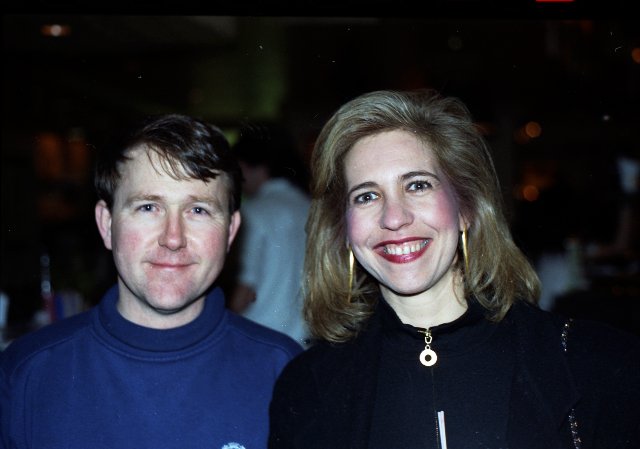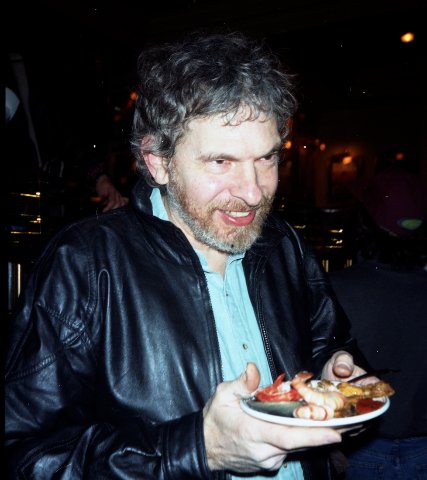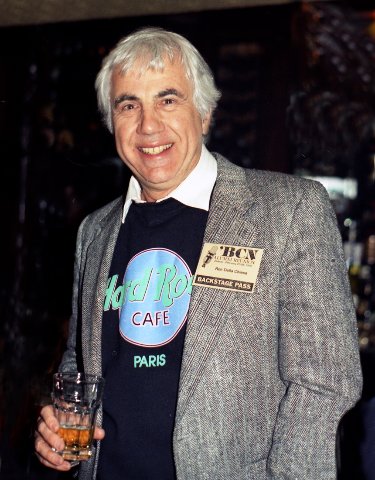Maui-Wowie with Charles Laquidara
Former WBCN DJ Retired to Paradise
By: Charles Giuliano - Jan 12, 2019
From 1968 to 2000, first on WBCN and then for the last five years with WZLX, Charles Laquidara was one of the most beloved, outspoken, and controversial DJ’s during a golden era of counter culture in Boston.
During the week he hosted a morning show The Big Mattress which started as a parody of AM shows like New York’s Imus in the Morning. On Saturday mornings all hell broke loose when the alter ego of Laquidara, Duane Ingalls Glasscock, unleashed his roiling and outrageous mishegoss.
Arbitron/ Nielsen ratings of two to four are regarded as good to excellent. Those for Glasscock were unprecedented at 13. At his peak, Laquidara was one of the nation’s top DJ’s and part of why, for a time, WBCN-FM dominated key demographics in Boston radio.
It is argued that Howard Stern, while a student at Boston University, tuned into The Big Mattress. There are aspects of his radio format that resemble Laquidara’s.
In 1973, Stern worked as a DJ for WTBU on a show called King Schmaltz Bagel Hour. WTBU was the first of several stations to fire Stern, after he ran a segment titled “Making the Bishop Blush.”
Eventually, Stern’s syndicated show bumped The Big Mattress causing Laquidara to move to WZLX.
During two lengthy phone calls to his home in Maui, Laquidara stated that he got out of ‘BCN and Boston radio in the nick of time. In 2000 he left in his prime and avoided the ugly endgame of decline and fall of all that was glorious about Boston’s unique counter culture media.
Charles Giuliano Aloha.
Charles Laquidara I’m just burning an English muffin here.
CG I’m sure you’ve burned something else over time.
CL Really. What time is it there? It’s only 9 AM here.
CG As you suggested I’m calling at 3 PM. To what extent have you been impacted by the eruption of a volcano. I understand that you’re on Maui but have there been any issues?
(A new lava flow opened in the Puna district of Hawaii Island the afternoon of Thursday, May 3, 2018.)
CL None whatsoever. It depends on which way the wind blows. Since the eruption, the trade winds have been blowing in the other direction. When those winds switch, as some day they will, they’re called Kona winds because Kona is a big area for tourism on the big island. So when the winds switch and come this way, then we’ll probably get some issues. We may get some ash which irritates the eyes. Who knows what nature is up to, but we’ll see.
CG How do you get from island to island? Or do you?
CL What usually happens here is people tend to stay in their own areas. People up country tend to stay away from the city life of downtown Maui and towns that are more populated.
CG It doesn’t sound like you’re suffering.
CL (Laughs) No Charlie, one of the interesting things is that me being an atheist from years and years - I’m very very grateful for, what’s that theory, the butterfly effect? There was a movie about it but wasn’t very clear.
(The Butterfly Effect is a 2004 film written and directed by Eric Bress and J. Mackye Gruber, starring Ashton Kutcher and Amy Smart.)
What it means is that if you knew that every single thing you did and every single thing that everyone else does, minute by minute, it’s not a theory really it’s true. Everything you do affects everyone else in some way or another. Whatever led you to be married or take the job you have? Whatever phone call you didn’t take which led to…? Everything depends on decisions that you make. If you take a left on a road you may pick up a hitchhiker who decides your future. Or that hitchhiker gets lost in the woods. It goes on and on. If you really knew how many changes that butterfly effect has you might never want to leave the house. Or get up from your chair because it impacts everything you do if you think about it. How you got your job? How you met somebody? What one friend did to change your whole life?
(In chaos theory, the butterfly effect is the sensitive dependence on initial conditions in which a small change in one state of a deterministic nonlinear system can result in large differences in a later state. The term, coined by Edward Lorenz, is derived from the metaphorical example of the details of a tornado (the exact time of formation, the exact path taken) being influenced by minor perturbations such as the flapping of the wings of a distant butterfly several weeks earlier. Lorenz discovered the effect when he observed that runs of his weather model with initial condition data that was rounded in a seemingly inconsequential manner would fail to reproduce the results of runs with the unrounded initial condition data. A very small change in initial conditions had created a significantly different outcome.)
CG It sounds like the butterfly effect has been good to you.
CL I’m thankful when I watch the sunsets out here every night. I realize how lucky I am. That’s all it is, luck. To be living in Hawaii for most of my life, twenty years now. I’ve spent more time here than even in Massachusetts.
CG You moved there in 2000.
CL I moved here officially in 2000, but my wife Doreen and I bought a home here a couple of years before that. Yeah, I’ve been here awhile.
CG I went to a vipfaq website that has rumors about Charles Laquidara. (Laughing) There appear to be a lot of them.
CL Is there a Charles Laquidara rumors page?
CG Yes. Like what’s his sexual orientation? What drugs does he take? Stuff like that.
CL Are you friggin’ kidding me? I would love to see it. Can you send me a link? Give me an example of what they said and I’ll tell you whether it’s true or not. What do they say about my sexual orientation? That I’M gay or ACDC?
CG As I recall a reader can check a box and there are a number of options.
CL So it’s like a survey.
CG I thought it was your site because it’s very graphic and colorful with lots of different boxes. You said to me “Go to my site and play a little bit” which I’ve done. I also came up with this which had some of the same feeling as your official site.
CL There’s a lot of Laquidara shit out there. But there’s nothing I can do about it. There are a lot of sites that praise me more than I’m worth. That’s what you get when you work on WBCN.
CG Can you quantify your fan base? It was demonstrated to me when you linked to my site and within a couple of days I got 3,000 hits. (For a mention in an article.)
CL It’s weird. When I left radio in August, 2000 I put it all behind me and said I’ll just go to Hawaii. I just think back on those days and again ‘BCN, not me, and the fact I was lucky enough to work there ‘BCN’s magic, mythology, tradition, whatever you want to call it, is so powerful that these people out there all kind of stuck around. They didn’t forget. So they see my name on Facebook and go OMG, ‘BCN. Most of what I do is what anyone with a public persona does right now. From having a dialogue with 20 people, or having a Facebook page with 35,000 people. It’s all about Trump which is the most amazing phenomenon I’ve ever heard of in my life. My Facebook page is 90% political.
It pissed off a lot of the ‘BCN people who are conservative. Boston has a very big base of conservative listeners. Boston itself is liberal but when you go to the suburbs, or inner city, like Southie, it changes. So I’ve got I don’t know how many people on Facebook. But almost half of them are very conservative. They hate my politics. There are a few dozen people who are always arguing with me and putting up their bullshit Fox news and doing all that stuff.
My very intelligent conservative friends, even though they know that Trump is a clown, they go along with the conservative stuff because that’s the state of America right now.
Some of my former listeners say ‘Charles why don’t you stick to the music? You turned into a leftie.’
In fact, for most of my ‘BCN days except for the end, they told me to back off on the politics because they wanted me to get good ratings. Every now and then I made a statement on the radio that would get me in trouble. They allowed me to do one huge thing and that was a boycott of Shell Oil. That went very well because any time anyone a celebrity or politician would come into the studio we would have them read a short audio bit that would ask listeners to boycott Shell Oil and tear up their Shell Oil credit card. Actually, it turned out to be pretty successful and I even got my picture in Time Magazine. It was a wicked ugly picture and I looked like Charles Manson, at least I made Time Magazine. It could have been worse a few years later Rolling Stone Magazine did a feature on me and called me Tony Laquidara through the whole fucking article.
(In 1986 the New York Times reported in part that…”Union officials joined leaders of the movement against South Africa's policy of racial separation today to call for a consumer boycott of Shell Oil Company products. Organizers said the boycott was the opening of a new campaign to get companies to withdraw their investments from South Africa. ''Shell is the first company on our list,'' said Randall Robinson, co-chairman of the Free South Africa Movement. ''It is not the last.'' The Washington-based group has organized protests at the South African Embassy here for more than a year to press South Africa to dismantle the country's official policy of racial separation… Owen F. Bieber, president of the United Automobile Workers, said union members would be urged to cut their Shell credit cards in half and mail them to the American Federation of Labor and Congress of Industrial Organizations…The action came at the request of the International Confederation of Free Trade Unions…Organizers said Shell, a wholly-owned subsidiary of the Royal Dutch/ Shell Group, was chosen for the boycott because of the parent company's heavy involvement in the South African economy, where it has petroleum and mining operations. Labor leaders also accused Shell of ''mistreating'' its South African miners.")
CG Was this kind of on air activism reflected in the music for your program?
CL The problem with the music, no matter who it is, Bruce Springsteen, Bono, Paul McCartney, all of them, Bob Dylan, they were all liberals. The conservatives showed an incredible ability to love Paul McCartney and Bob Dylan, Bono, Sting and everybody. Leonard Cohen, but they still kept their conservative views. I don’t know what the heck they do what these Trump lovers do with lyrics. The lyrics hit them in the brain but I don’t know what it does to them. They don’t get it.
Do me a favor spell my name right and fact check for spellings. I used to be an English teacher and mistakes drive me nuts. Good luck with spelling mishegoss.
CG No problem. I graduated from Brandeis so I use a lot of Yiddish.
CL My son went to Brandeis. What year did you graduate? He was born in 1980.
CG 1963. I read that it took you four years to do two years at RISD?
CL My dad was a barber so I was lucky to even get into RISD. I guess one day they decided that there would be some kind of Italian quota. So they let me in. Yeah, I had to work for a year.
CG Were you considering being an artist?
CL I wanted to be a political cartoonist.
CG I e-mailed you that you did cartoons for a parody I wrote of Hunter Thompson and gonzo journalism. It was for a one off Phoenix tabloid project twenty years ago that David Bieber put together.
CL Did you send me those illustrations or just tell me about them?
CG Bieber has them in his vast archive but he is very difficult to contact. A friend who “works with him” says that it is impossible to reach him. He has a warehouse which is being considered to be a museum but it’s a work in progress.
(David Bieber was a publicist for WBCN, the Boston Phoenix, WFNX, and other media outlets. When writing a thesis on pop music as a student of the Boston University School of Journalism he compiled back issues of Billboard Magazine as part of his research. That snowballed. Bieber has signed a 20-year lease at the Norwood Space Center which will serve as the home to over 600,000 items of pop culture memorabilia. Though not open to the public, much of the Bieber Archives will be unveiled via future Space Center exhibits, in addition to Boston’s The Verb Hotel.)
CL If the cartoons ever show up ship them off to me. That would be great.
CG I was surprised when Bieber used you as the illustrator for that Phoenix supplement. Prior to then I had no idea that you did graphic art. Also in an e mail I mentioned that I saw you perform at the Loeb Drama Center in That Championship Season. (A 1972 play by Jason Miller. It was the recipient of the 1973 Pulitzer Prize for Drama.)
CL Again Charlie, I don’t know if there is a word for someone who is pretending to be humble and is actually bullshitting, but all my success was about finding the right people. For That Championship Season Tommy Thompson was a fantastic director. Whatever qualities I had he brought it out. I was not that good an actor but Tommy was such a great director.
Do you remember Pat Collins back in the day? She worked for the Globe.
CG No she was a TV critic.
(She started in Boston media and became a three-time Emmy winner for WWOR-TV. Collins was an entertainment editor and film critic for Good Morning America, The CBS Morning News and from 1972-1977, hosted the Pat Collins Show which won two Emmys on WCBS-TV.)
CL She was like Louella Parsons. She saw my name on the marquee and figured I was just that DJ from a hippie rock station. She gave me a great review.
CG All these years later I recall that production and your performance. That speaks well to your acting.
Famously you did a screen test for The Boston Strangler. (The 1968 film starred Tony Curtis.) That could have been a butterfly.
CL For sure. What happened was I didn’t do a screen test. I was working in the print shop of 20th Century Fox. I saw the script for The Boston Strangler and I stole it. I made a copy and took it home. I asked some of my actor friends to help me like Charlotte Stewart from Little House on the Prairie. She played one of the women that Albert DeSalvo killed. We used a video tape recorder which was unheard of at the time. It was a new invention. Jerry Lewis was starting to use it in films that he was directing.
We rented one and I did an audition scene. At the time I was dating the secretary of the producer of the show. She let me into his office when he was out to lunch. I set up a video recorder in his office. When he came in the shades were drawn down. He called her on the intercom and said “What the heck is going on?” She said “There’s this fellow from the print shop and he has something he wants to show you.”
I actually have a copy of that scene in Daze in the Life: A Slightly Disjointed Multimedia Memoir.
I played the Boston Strangler for about 20 seconds. He said “where have you been?” He was all excited. He was going to cast me right away and talk to the director. He set me up for a screen test. So there I was in the middle of the stage a few weeks later with all of the producers and directors of 20th Century Fox. I can’t do cold readings and I thought that was the end of it.
CG You went on to better things. On your website I saw you as The Godfaddah. You did the scene when Don Corleone dies in the tomato patch.
CL (Laughs) Yeah I did the Godfather in Hawaii.
CG You took over from Peter Wolf (as WBCN DJ).
CL Yes but it’s interesting how history changes depending on who experiences it and how they remember it. According to Steve Segal, The Seagull, Steven Clean, who says he was the program director at the time. I had just moved to Boston from California because my Mom was sick. I called ‘BCN and was invited to the station. Peter Wolf had just started working with a band. He was doing late night at ‘BCN, according to Steve Segal, Peter had a gig with the J. Geils band which had just formed. So he asked if Charlie “Master Blaster” Daniels could take Peter’s slot. Do you remember him?
CG Of course, he was the MC for the Tea Party.
CL He asked Charlie Daniels to substitute for him (Wolf). So he went on air and said whatever girls might want to come down and give him pleasure, or whatever it was, it was not cool. Segal said to Peter you have to make up your mind whether you want to be a DJ or with that band (J. Geils). So Peter quit.
About the same time Tommy Hadges was working daytime. According to Segal, Hadges decided that he wanted to go to dental school. We called him Captain Novocaine. He decided to go back and finish up at Tufts. So there were openings at night and during the day. Steve decided to put Jim Parry on at night and me during the day.
But if you talk to Joe Rogers, Sam Kopper, Al Perry, Tommy Hadges you’ll get an entirely different version or bunch of versions of this.
(Hadges and Joe Rodgers were students of Tufts who were DJ’s for M.I.T.’s WTBS. They were recruited to WBCN by its rock entrepreneur Ray Riepen. Together they launched rock as a new format for the station on March 15, 1968 playing “I Feel Free’ by Cream. The staff also included Wolf, Sam Kopper, Al Perry and Jim Parry.)
Segal’s take is totally different from the legend. You can decide which of the two the right story is. History is written by the winners. Both Kopper and Segal are alive with different versions. That was winter of 1968 when I came to ‘BCN.
CG Can you talk about T. Mitchell Hastings (founder of WBCN) and Ray Riepen who convinced him to switch to a rock format?
CL Yeah, but there are so many different things to talk about. What I can say about T. Mitchell Hastings is that he was a weird guy, an eccentric. He was just trying to make money for the station and he thought that there was money in rock ‘n’ roll so he let the people do what they ended up doing. It turned out to be very profitable. He sold the station for a lot of money. He could have made ten times that if he waited.
(Theodore Mitchell Hastings, Jr. was an engineer genius who launched WBCN FM on April 24, 1958. It was, originally, a classical music radio station. Prior to broadcasting he invented an FM radio for the car and an early pocket FM transistor radio. Until then there was little access to FM radio and minimal commercial potential. He formed the General Broadcasting Corporation, later to be known as Concert Network Inc. Hastings acquired, then changed the call letters to: WNCN New York City; WHCN Hartford; WXCN Providence; WRCN on Long Island and WBCN Boston. Hastings and his wife were followers of the clairvoyant Edgar Cayce whose predictions influenced questionable business decisions. That resulted in selling stations with only WBCN left when Ray Riepen convinced him to experiment with rock radio. He remained as general manager and owner. In 1973 he moved the studio to the top of the Prudential Tower. He sold the station to Hemisphere Broadcasting in 1979. That sparked a strike against new management.)
There’s a story that Norm Winer, Old Saxophone Joe, could tell you. One day he was in Mitch’s office, and in the middle of a conversation, he said “excuse me” leaned over a shopping bag with new socks and changed his socks. Hastings didn’t wash his socks he just bought new ones that went up to the knee.
As far as Riepen goes I can’t say enough great things about Ray Riepen.
CG Oh really!
CL We had ups and downs. I pissed him off a lot. The drum solo story you might have heard of.
CG Of course.
(Ray Riepen, a Kansas lawyer who enrolled for post grad work at Harvard Law School, was driving around listening to his station. Laquidara was playing a drum solo. Riepen called and told him “no more drum solos they’re boring to listeners.” Charles hung up and played nothing but drum solos for the rest of his show. Riepen, initially with David Hahn, also started the Boston Tea Party and had a piece of The Cambridge Phoenix an alternatively weekly. Facing labor disputes he sold his interests and left town. It is rumored that he bought an abandoned mining town in the West. He has remained under the media radar. A resident of Kansas he has attended the occasional WBCN reunion.)
(Charles upon further reflection e mailed a correction regarding the Riepen, drum solo story)
John Brodey (the new guy) played ONE drum solo on that fateful day and Riepen called him up on the hot line and told him no one wants to hear drum solos on a Sunday afternoon. I (who had been tripping on mescaline that afternoon) came in to do my shift following Brodey and he was very upset. when he told me what happened, I went on the air told everyone about Riepen bragging to his friends and how bosses should never call DJs on the hot line during their radio shifts....and then I played a bunch of drum solos.
CG Riepen may have had a point there. Mostly rock drum solos are rather enervating. For me the memorable ones are jazz drummers. Gene Krupa on "Sing Sing Sing" during the Benny Goodman Carnegie Hall concert. Louis Belloson's solo for "Skin Deep" with Duke Ellington. Buddy Rich was always amazing with his big band. During a jazz festival I was astonished when Max Roach came on stage with high hat cymbals and played them for some twenty minutes.
Riepen can't have been pleased with your defiance of his authority.
CL He hired Arnie Ginsburg and his main job was to fire me which he did.
(Arnie "Woo-Woo" Ginsburg (born August 5, 1926) was an American disc jockey in the Boston radio market from the mid-1950s to the 1970s. Following this period, he was a business manager, president and owner of WVJV-TV, and later an executive with Pyramid Broadcasting and program manager of their Boston station WXKS/1430.)
The legend is that when he fired me they formed a union and that’s how we beat the Infinity Broadcasting people from New York when they bought the station.
(The staff went on a three-week strike against WBCN in 1979, when Hastings sold it to Michael Wiener and Gerald Carrus.)
Through Riepen, Ginsburg fired me but Hastings went over his head and hired me back. When Ginsburg fired me Danny Schechter put together a union saying if they can fire Laquidara they can fire anybody.
("Danny Schechter, the news dissector," as he was known, died at 72 in 2015.)
I think Danny and the fellow who was news director before him, Bo Burlingham, would have different versions of how our union was formed.
Both stories sound good and it’s a matter of finding the right one. I don’t know Charlie… everything is so foggy that whatever you write will be OK.
CG I’m trying to put together an overview of what was happening in the 1970s.
There is the sense that compared to what was going on in New York and San Francisco the counter culture in Boston has gotten relatively little respect. In that context WBCN was a dominant radio station of the era. Everything was new. There was no template. You guys were inventing it as you went along. How did that evolve, in your case, into The Big Mattress?
CL The time you are talking about, the 1970s, ‘BCN was very popular with college students, the millennials or whatever you called them back then.
There is a movie coming out in a week or two by Bill Lichtenstein called “WBCN and the American Revolution.” It addresses the era and issues you are asking about.
(WBCN and The American Revolution is a new, feature-length documentary film that takes viewers on a dazzling, rock and roll roller-coaster ride to witness the dramatic and historic political, social and cultural events during the late-1960s and early-1970s during what was one of the most volatile and transformative eras in this nation’s history, propelled by a powerful soundtrack of some of the most evocative and memorable music ever created.)
CG How did that evolve, in your case, into The Big Mattress?
CL The major shift of prime time FM listening was not morning drive time. Nobody listened then. They were listening to WBZ, RKO or whatever. They were on their way to work getting the news, weather, traffic, whatever. The most popular shift for ‘BCN was 6 pm. That’s when people were stirring their rice, cooking, smoking dope and getting ready for the evening. So that was prime time when I was working. Dinah Vaprin at the time was working mornings. We had these weekly DJ meetings.
This was the time of Bread and Roses and the women’s movement was getting active. Dinah Vaprin was down at the front of the room. She raised her hand and said “How come women always get the shit shifts? Why do women get stuck in the morning?”
I said “Dinah, there’s no such thing as a bad shift at WBCN.” (Laughing) At the time I thought that may be the biggest mistake of my life. She turned and said “Ok fucker, you take mornings.” So I said “Ok, I will.”
I left the meeting and said to the program director, Norm Winer, “What the fuck did I do?” He said “Sorry but you’re now on mornings.” (Both laughing) So it was weird. What was I going to do with the morning shift?
So I said why don’t we do a parody of AM morning shows and do all this stupid stuff? Let’s just have some fun. At that time morning radio was like that guy in New York who wears a cowboy hat.
CG Imus in the Morning. (The show ended after 50 years in 2018.)
CL He put out a vinyl record of wakeup calls. I said, damn, that’s what we’re going to do on ‘BCN. So Charlie, I swear to God, everyone in Boston and radioland forgot about Imus and they give me credit for those calls. Which is very interesting, that I get credit for inventing the radio wakeup call. But, really, it was Don Imus.
Anyway we used it and took it to a different level. Imus did a lot of scripting and most of them I’m pretty certain were acted out in advance. But I’m not sure. My calls were not rehearsed and sometimes we didn’t have delay and might have risked our FCC license once in awhile.
CG To what extent did Big Mattress pull together aspects of your background? In some respects you became what today we would call a performance artist.
CL I could give a little credit for my success, first of all to the fact that I was a big, testosterone laden, Italian bullshitter. Fuggedaboutit. Screw your mother. Going to RISD. I remember being turned down by a girl because it was a time in the ‘60s when rich girls were having coming out parties. “Coming Out” had a different meaning then than today. They were debutantes. I remember being totally in love with one of my classmates. She was a debutante. Her dad wouldn’t let her go out with me because I was a barber’s kid. I remember driving away from her house crying and playing Verdi’s Aida full volume on my car radio.
It was that kind of time and having that experience of being with all these wonderful artists who were so much more creative than I. Being so lucky to be at Rhode Island School of Design and meeting all these incredible true artists who went on to great things.
Then going to Pasadena Playhouse, with all of its great actors. My girlfriend, Deanne McKinstry, was a great singer, a soprano. One of my best friends, Danny Truhitte, got one of the lead parts in the movie The Sound of Music. He was the one who sang “Sixteen Going on Seventeen.” Danny came to Milford, Mass, to visit me. We brought my parents to see Sound of Music and they didn’t know he was in it.
All these stories are in Daze in the Life and you can use them for your article.
CG Unfortunately, there are so many stories that you are the War and Peace of radio. So I’m trying to catch the highlights.
CL It is true but there are certain things I can point you to check out. There’s the story of me flying with The Blue Angels. You’re right there’s a lot of stuff.
CG It fascinated me that you had an early gig as a classical radio DJ. There was a particular interest in opera. To what extent is that a part of your Italian heritage?
Cl None. None whatsoever. That came when I was living in Pasadena and when I went to RISD. This was before rock ‘n’ roll which didn’t come in until the late ‘50s. Doo-Wop and that. What we were romancing to was Pat Boone, Johnny Mathis, maybe once in a while they would play a black guy on the radio.
CG For me it was The Platters.
CL Absolutely. “The Great Pretender” (1955) and songs like “Silhouette” (The Rays, 1957). And “Why Do Fools Fall in Love” (Frankie Lymon and the Teenagers 1956). But there was no rock ‘n’ roll as we know it today.
There I was at RISD with all those artists and rich kids. Some were working class like me. But I wanted to fit in. I remember going to a party and they really knew how to party. My first year there. Here I am, just turned 18, fresh out of high school from Milford, Mass., a dinky suburb of Boston. With a Boston accent. There I was at a RISD party. I didn’t know anybody. I didn’t get laid until I was 20 later at Pasadena Playhouse. Most of the Catholic girls I grew up with you got nowhere. You couldn’t get below the third button before they were grabbing the crucifix.
So here I am at this wild RISD party with everyone dancing. I didn’t know the basic rule that you have to immediately find someone you know. Or someone you can talk to and go to them. That’s your place of comfort.
CG I had a somewhat similar experience. I went to these pre-deb parties, The Beacon Assemblies, with kids from private schools. Coming from a public school I didn’t know anyone. The guys were slow and awkward and hung together talking about school and sports. Being alone I went over and asked girls to dance. I was a good dancer so that cut the ice and they liked me. By the second or third occasion they were hitting on me. At that point, I didn’t give a fig about being friends with the guys.
CL It’s called “Partying for Dummies.” When you find that place you’re secure and can go grab a drink or whatever. With a cigarette in one hand and you’re all set. People come to you because you look like you’re cool. But at RISD I didn’t know that yet.
I was standing by myself in a corner and a girl came up to me. She was half in the bag and said “Can I ask you a personal question.” I said “yeah” and she asked “are you gay?” She was really hot and I said “Yeah, can you help me out?” (Both laughing) It did not work. I didn’t fit in at all.
CG Did you read “Partying for Dummies?”
CL No, I just made that up.
CG We should write it. That would be a best seller. Eventually, who could you relate to at RISD?
CL One of my friends was a classical music aficionado, he turned me onto all kinds of great music. Verdi’s “Requiem.” Music as powerful as “O Fortuna” from Carmina Burana. He turned me onto all kinds of stuff like Rachmaninoff’s “Second Piano Concerto,” Tchaikovsky’s “First Piano Concerto” and all this beautiful music that took me to other places. One of the first classical albums I bought was Rachmaninoff’s “Second Piano Concerto.” The cover was so beautiful. It was a photo of a young couple walking along a stone wall with the ocean behind them. The way they were dressed was so intriguing. I loved that album and cover so much I talked about it on Facebook way back when it first started.
I told the story of how to this day I remember that album. I went on the internet and got a picture of it. That couple walking along the wall in Czechoslovakia on a cold day late in the afternoon. I played it over and over. I was thinking about what it must be like having a girlfriend and being out there. Being in another country. I was talking about that and this friggin’ guy texts me or writes me or whatever you did back then and says “Charles, my dad took that picture.” It was up on the North Shore or wherever it was. “It’s not a Nordic country. It’s the North Shore.” Maybe Peabody or wherever. He said “My Dad took a picture of his yoga teacher and her boyfriend.”
Regarding Big Mattress when I took over mornings and we were doing all this crazy parody stuff of AM radio I needed a name for the show. I didn’t want The Charles Laquidara Show. We thought of it as a hippie thing with people waking up from different parts of New England. So a guy in Arlington is waking up and saying good morning to a girl in Providence. Somebody in Milford will wake up and they’re on this big, big mattress. They are waking up together and saying good morning.
Today, if you’re not from Boston, Big Mattress sounds like a porn site.
CG You were something like 25 years doing a morning show. How did that impact your lifestyle? What time did you have to be there?
CL They kept changing drive time. At first it was 6 to 10AM. Then it was 5:30 to 9AM. I was getting up at 3:30AM. Sometimes I would bicycle in. During my last days in the late ‘80s and ‘90s I was living in Dover. On an almost level road it was exactly 15 miles door-to-door.
CG What time did you go to bed?
CL Maybe 9:30 or 10PM except on Thursday nights when Matt Siegel and I would go to a club called Zanzibar (at Boylston Place). We would do shooters. It was a disco place and one night we were walking in and all these girls were going up to Matt saying “Oh Matty, I loved that show when you talked about your wife having those breast implants.” He would say “This is Charles Laquidara” and they would say “Oh, hi.” They would totally friggin’ ignore me.
I had season tickets and would take him to The Patriots. From up top there would be drunks yelling “Hey Chuck.” I would say “This is Matt Siegel” and they would say “Right, hey Chuck play Led Zeppelin.” So I had all the guys and Matt had all the girls.
Duane Glasscock had the highest ratings in radio. Carter Alan can confirm that or Tony Berardini. His ratings were phenomenal. A really good rating in Boston was always between 2 and 4. Duane Glasscock’s ratings were 13.
CG What became of him?
CL We killed him. Oedipus (program director) killed him. It was time for him to go. I was getting headaches. It was a lot of pressure and stress. After awhile I just felt like it was burning out.
(Laquidara introduced his alter ego, Duane Ingalls Glasscock, a “vile sexist” who spoke with a thick Boston accent. As an antidote to PC he initially used a vulgar catchphrase suggesting anal sexual assault. Have you ever been b____d up the ___ for being a f____g wiseguy? When told to desist it became "Have you ever been phoned in Upton, Mass. for being a lucky wise guy?" Duane opened shows with the phrase "Hello, Rangooooooon!" The Glasscock character, who hosted his "own" show on Saturday mornings, received higher ratings than Laquidara's regular weekday broadcasts.)
CG Why was there pressure and stress?
CL OMG. Saturday mornings. Picture this. You walk into the Prudential building at 10 AM and go up to the 50th floor. All these people, the most brilliant people in the world, Eddie Gorodetsky, Billy West, Mark Gordon at the time was one of the producers, Tom Couch, all these interns. It was like an event in the studio.
At the Prudential there was a window and you could see people walking by. It was like theatre. It was going on inside and outside. When Duane did the “bag of shit” thing people were outside waving. We were getting phenomenal ratings and ‘BCN was number one.
Duane goes on the air and starts talking about “these fat cats in Beltsville, Maryland, driving around in Cadillacs and they don’t know anything about ordinary people. They’re in charge of radio ratings and call themselves the Arbitron Research Bureau.”
(Speaking with Duane’s Boston accent.)
“They gave Tommy Hadges a lousy ratings number and Mark Parentau only got a 4!” (Which is a phenomenal number.) “They gave me only a 13! There’s four people on phones right now and ten people outside so I know we have at least a 14! So send them a bag of shit!”
He gave out the real address and he did that every break. I’m sure they got a lot of bags of shit. Arbitron (now Nielsen Audio) never paid attention to it. They ignored it. They didn’t even write to ‘BCN.
The following Monday was when Duane got fired.
CG You talk about he.
CL Before you ask that question I’ll give you an example as an answer.
So Monday Charles Laquiara, me, is doing his show and Klee Dobra our manager pokes his head in and says (with a grave tone) “Charles I want to see you after your show.” He’s sitting in his office with an enormous cup of black coffee which, he’s so pissed off, he’s stirring with a finger. Sitting right across from me with the veins bulging in his neck.
“Charles Laquidara is a consummately professional disk jockey” he said. “Charles is the person who is bringing us wonderful numbers and Charles is someone I enjoy working with. But Duane Glasscock is a fucking idiot and Duane can never be on the radio again. He’s fucking fired.”
I go “Klee you can’t fire Duane. He’s got great fucking ratings.”
There’s a long pause then he looks at me and says “What, are you playing with a full deck? You’re acting as if Duane is somebody else.”
I said “Klee you just fired him and kept me.” (Both laughing) I had to keep the two separate, to answer your question. Duane had a Boston accent but I didn’t. Duane was not PC and I was. It was all that and I tried to keep it separate.
CG That sounds like Andy Kaufman and Bob Zmuda. There was a long debate as to whether they were one and the same or aspects of a great prank and hoax.
What could Duane do that you couldn’t do?
CL Oh shit. Duane could have girlie watch. He could send bags of shit to Arbitron. Duane could make fun of the President. He could be a Republican in a lot of ways. He talked about how PC is stupid. Even to this day, on Facebook, Duane has thousands of friends. Duane friends everybody while I only friend people I know. Most of Duane’s Facebook friends are to the right of Attila the Hun.
CG Do you miss Duane?
CL No. Ask me again I didn’t answer fast enough.
CG Do you miss Duane-
CL (Emphatically) No.
CG It sounds as though Duane provided you with some psychological balance. With Duane gone how do you maintain Yin/Yang?
CL First of all I don’t have to achieve that. I’ve been retired for almost 20 years. If you’re talking about Charles Laquidara on the radio, how did he achieve that balance? He had to go home to his family. He also had friends who were very conservative. That’s how I did it back then. As far as now goes there’s no Duane in my life.
Especially when the Me Too thing came along there’s no way I’m stepping in that shit. No way I’m getting into that one. I’m totally respectful of that movement. Trump has brought out the worst in people- and now we know who they are. Friends and neighbors have shown their dark side. That’s one of the good things that Trump has done so now I know more. I have a lot of conservative friends but now I see a side of them I never saw before. That I didn’t want to see before.
CG You appear to be financially secure so there is seemingly little incentive to earn a living. But several months ago you did a nightclub gig in Boston at Paradise. So you appear to surface occasionally.
CL On March 14 there was a big launch party for Daze in the Life at the Paradise. I did that for my book. (Actually a multi media, on line site with many hours of video material and radio clips.)
Also there’s a movie out I Am What I Play.
(It is available for rental on Vimeo. Documentarian Roger King’s look at the careers of four legendary DJs, CFNY Toronto PD/jock David Marsden, WBCN Boston’s Charles Laquidara, WNEW New York’s Meg Griffin, and KJR Seattle’s Pat O’Day. Marsden and O’Day bring some stories from the AM Top 40 era, but the focus is on the progressive rock era of the ‘70s and early ‘80s.)
It’s about me and three other DJ’s who the producer says changed radio forever.
CG But now it’s all gone. How do you explain that? Tea Party, Phoenix, ‘BCN, all gone. Of thing that were so vital to our life in Boston during that era there’s nothing left. What happened?
CL Things change. You can have a cigarette in your hand and light it or hold it for a hundred years. Eventually things just go away. ‘BCN died a very slow, painful death. Getting out in 2000 was just in time. I just made it. I made the cut. If I stayed there much longer it would have been horrible.
I was one of the lucky people. James Dean died in a car accident. Marilyn Monroe was still beautiful. Jane Mansfield was pretty. All those people. I didn’t die, but unlike those celebrities I mentioned my persona didn’t die. In fact the people who are still alive remember me and the great stuff we did at ‘BCN. I left radio at the right time. I left ‘BCN when it was still at its height. It was still a viable station. It had gone very commercial and wasn’t the same as the 1960s. It had morphed into some bullshit.
As our listenership increased, because we were playing more hit songs more frequently and the music itself was changing, younger listeners wanted to hear punk and alternative rock. Also, Howard Stern had come into the radio scene and there was a lot of pressure on me to play the new music and talk about things that entertained a younger audience. For example, I remember Mark Parentau got called on the carpet for complaining about a snowstorm when our young listeners wanted to go skiing.
It didn’t take long before we all realized that most of my older listeners hated alternative rock and drifted over to WZLX. Howard Stern, meanwhile was always complaining on his nation wide syndicated show, “When is Laquidara going to quit or die? Those suits at WBCN in Boston are running my morning show at night which is ridiculous!” Howard and I got along really well and I was one of the lucky ones because he would destroy competing DJ’s in every other market he moved into. He was definitely kidding, tongue in cheek, saying that but we all knew it was time for me to move out of ‘BCN. So on April Fools Day, 1995, Howard Stern suddenly appeared on WBCN in the morning. I appeared on WZLX in the morning, and nobody knew whether it was a joke or not for weeks. I stayed at WZLX until I retired from radio on August 5, 2000.
As you said, I’m living in Hawaii now and have some 34,000 ex listeners and a lot of new people who get turned on to my Facebook page. That’s an outlet where I can vent. I can do funny things and entertain.
A lot of people use Facebook like a diary or they post pictures of dogs and kids. It’s a wonderful social media thing. They try to stay out of the fray, the political fray, but I’m in it up to my ass. It’s like my radio show and I control it. I open the lines up so the Trumpsters can write their bullshit. But I regulate it. If you go to my Facebook page you’ll see that I have a limit of two comments per post. People can’t go on and on arguing back and forth. Make a statement, a reply to their statement, then they’re off. To me, Facebook is my radio show. I spend a lot of time on Facebook.
I also spend a lot of time exercising. As I get older I want to live as good a quality of life as I can. (He was born November 24, 1938) I have a trainer I work with twice a week. I exercise every day. I swim about a mile once or twice a week.
Definitely, I have a different lifestyle than in the past. I’m a bachelor now. My two kids are grown up and I have two grandchildren with another on the way. I’ve moved on I guess.
I still do a lot of things I enjoy. I like getting into politics. Trump has been a wonderful cash cow for all the late night shows. God knows what all of those shows are going to do when he leaves office. Those writers are going to have to find something else to do. Right now Trump is writing all of their shows.
He’s in everybody’s head. He’s such an asshole and whatever luck, fate, Russians, or stupid Americans put him in that job is probably the most amazing event in the history of the civilized world. Or in the history of modern politics. There never will be anything like it again. There never was before. He’s gotten all of these people who would never go to a protest, who basically don’t give a shit, people who say I have my family and job to take care of. I don’t have time for politics.
He’s got all of these millions of people now politically involved. He has mothers who would never go to a march now going and hating him so much. He’s brought the left together. Most of the moderate Republicans I know are almost Democrats now. Everything they think or do is liberal. Because they hate Trump so much. So he’s done a fantastic service to the country and the world. He’s also got to get out of office because he’s making permanent decisions that are destroying the planet and democracy.
Climate change is the elephant in the room. Everybody is worried about conservative judges on the Supreme Court, paying for the kids’ education, about whether gays should have rights or no, and about wars in Afghanistan. None of that shit will matter within the next few years because the weather is not going to get better and climate change devastating effects are going to destroy our infrastructure and our economy. So Trump has to go as quickly as possible because that dope doesn’t even believe in climate change, global warming, or the effects of fossil fuel. In the meantime, the rest of us are powerless to do anything except vote for change and hunker down with our families.
All I’m saying is that I’m having a good life in Hawaii. I have Facebook and movie night once a week (laughing). I invite friends and neighbors and we watch movies.
CG People have perceptions of you including myself, as an oddball, free spirit. The discipline of 25 years of a morning show implies something different. Most people don’t comprehend what that means; the demands of showing up, being there, and doing the gig. Having to be totally on while the listener is just getting up and having morning coffee.
It implies that given the odd hours you missed a lot. Like being on the scene and going to rock concerts.
CL Matt Siegel never went to any of the shows. Because he also had to be up early in the morning. I would say that back in the day most of my listeners, and 100% of the people I now have on Facebook know more, and are more into the music than I am. I have a lot of favorite songs. I don’t have a lot of real favorite groups. My listening is more like the average person. Not like the average music lover. The average American. I know what songs I like but I don’t go to concerts. Even when they come here to Maui. Once in awhile there is a concert I would love to see. I missed Amy Winehouse. I was waiting for her to come to Maui. She never came but that was a concert I wanted to see.
I’m not into the music that much. My thing on radio was that people just liked my personality. My persona. It didn’t have much to do with the music I was playing. In the last half of my career ‘BCN was deciding what songs I should play.
CG Who gave you the play list?
CL Fortunately, people who really knew the music. They also knew about ratings. They talked with consultants. People like Oedipus and Tommy Hadges, Carter Alan, these people really knew their music.
CG Well Charles, even in Maui, no man is an island.

